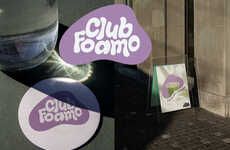Jeremy Gutsche — November 29, 2006 — Marketing
References: nytimes & news.agendainc
If consumers create fan clubs for brands they love, then it seems only natural that they will create clubs for brands they hate. After all, commiseration brings people together. One site, Rachael Ray Sucks, helps to make it happen. It's good, but I still like F*ckedcompany.com even more.
Implications - So far the Rachel Ray Sucks community consists of over 1,000 members. According to the site's official explanation, the community was "created for people that hate the untalented twit known as Rachel Ray." Although it's amusing how much vitriol its members have for a relatively benign cooking host, sites like this suggest that there might be a future out there for more anti-fan clubs to emerge.
Implications - So far the Rachel Ray Sucks community consists of over 1,000 members. According to the site's official explanation, the community was "created for people that hate the untalented twit known as Rachel Ray." Although it's amusing how much vitriol its members have for a relatively benign cooking host, sites like this suggest that there might be a future out there for more anti-fan clubs to emerge.
Trend Themes
1. Anti-fan Clubs - The rise of anti-fan clubs indicates a growing trend of consumers forming communities around their dislike of certain brands or personalities.
2. Commiseration Communities - Online communities dedicated to expressing dislike and sharing grievances about brands or public figures are gaining traction, creating opportunities for disruptive innovation in the realm of consumer sentiment analysis and reputation management.
3. Brand Hate Cultivation - The emergence of platforms like Rachael Ray Sucks demonstrates the potential for cultivating and capitalizing on brand hate, paving the way for disruptive innovations in targeted marketing campaigns and product positioning.
Industry Implications
1. Social Media and Community Platforms - The growing trend of anti-fan clubs presents opportunities for social media platforms to create specialized communities that cater to people's desire to express their dislike of certain brands or individuals.
2. Brand Reputation Management - The rise of anti-fan clubs highlights the need for innovative solutions in brand reputation management, including sentiment analysis tools and strategies to address and mitigate negative sentiment.
3. Marketing and Advertising - The existence of anti-fan clubs opens up new avenues for disruptive marketing and advertising campaigns that harness the power of controversy and harness negative sentiment to create buzz and engage target audiences.
3.1
Score
Popularity
Activity
Freshness






















